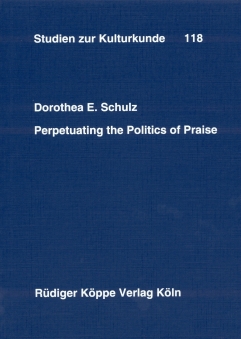
Perpetuating the Politics of Praise
Jeli Singers, Radios, and Political Mediation in Mali
Author: Dorothea E. Schulz. Series edited by: Beatrix Heintze, Karl-Heinz Kohl.
Series: SzK Studien zur Kulturkunde Volume 118
2001296 pp.
appendix: Bamana Versions of Praise songs
Text language(s): English
Format: 170 x 240 mm
510 g
Paperback
€ 49.80
Buy 'Perpetuating the Politics of Praise' as a downloadable PDF document directly from our online shop »
Order 'Perpetuating the Politics of Praise' as print edition »
The book describes continuities and changes in the political significance of jeliw (sing. jeli), praise singers, in Mali who performed crucial tasks of reputation management on behalf of wealthy and powerful families in the nineteenth century. Based on extended research in rural areas of southwestern Mali and in the capital Bamako, this study illustrates the effects and limitations of a mode of symbolically constructing rightful rule, and of its transformation in a changing institutional context. The performances of jeli musicians on broadcast media are taken as a starting point to illuminate two aspects of state formation in Africa: the emergence of a public domain established by broadcast media, and the creation of a national culture.
Sociopolitical change and the commodification of praise performances have undermined the patronage relations between jeliw and patron families which once provided the institutional context for the jeliw's symbolic representations of power. Today praise performances of jeli praise singers do not validate their patrons’ claims to positions of influence in national politics. Since the creation of Mali as an independent state in 1962, jeli musicians and traditionists have contributed important elements of a “national” culture while drawing primarily on the music, cultures and traditions of southern Mali. Some of them, mostly women singers of sometimes international renown, have become emblematic figures of Malian popular culture. Because their music is predominantely displayed in the public domain established by the national radio, they sustain the homogenizing effects of the governmental politics of culture. But their music also serves listeners from the south as a medium to assert the particularity of their local traditions in a multicultural nation state.
Under accompanying material you will find further publications on oral literature and history of Mali.
Accompanying material:
- Heinrich Barth et l’Afrique
(ISBN 978-3-89645-220-7 ) - L’empire du verbe et l’éloquence du silence
(ISBN 978-3-89645-215-3 ) - Le jeu et le sérieux
(ISBN 978-3-89645-208-5 ) - Nyagalen Mugan Tarawele
(ISBN 978-3-89645-263-4 )
Reviews
Schulz has to be praised for her theoretical orientation; the book is clearly related to issues in present-day Africa. Schulz rightly criticizes the many scholars who tend to quote many “classic” works on Mande ethnography that are preoccupied with explaining the jeli’s social position and which make little effort to relate their findings to contemporary theoretical issues in Africa. This implies a danger of producing essentialist notions of culture and behavior. Schulz, however, takes the theories on state formation and on patron/client relations as her point of departure and focuses on the way political institutions search for legitimacy (and/or hegemony) and on the structural transformations of the public sphere that have taken place. This is the background she uses to present to the reader a wide range of jeliw and their activities.
Jan Jansen in International Journal of African Historical Studies, 38/2, 2005, 329-336
| « back | Print version | [top] |
 Books
Books Audio
Audio Biographies
Biographies Series
Series Festschrifts
Festschrifts Journals
Journals